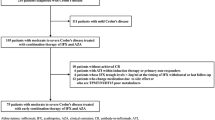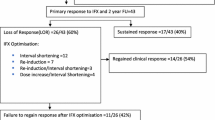Abstract
Background
Usefulness of thiopurine and scheduled infliximab combination therapy in non-immunomodulator (IM)-naïve Crohn’s disease (CD) patients and the optimal length of dual therapy are still debated.
Aims
To determine proportion of patients developing disease flare requiring rescue therapy and risk factors associated with disease flare after de-escalation of IM from combination therapy.
Methods
Adult CD patients in clinical remission on combination therapy were identified from a large single-center database between 2002 and 2009. Patients who had their IM stopped in the absence of adverse events were included. Association between clinical and demographic variables and time until rescue therapy was analyzed using Cox-proportional hazard models.
Results
Forty-three CD patients on combination therapy in clinical remission at time of IM de-escalation were identified and followed up for a median duration of 61.6 months (range 5.4–129.5). Median duration of remission on combination therapy prior to IM de-escalation was 12.0 months (range 4–74). Thirty-one patients (72.1%) required rescue therapy during follow-up. On multivariable analysis, age at diagnosis < 16 years versus > 40 years (HR 4.55, 95% CI 1.18–17.62, p = 0.028), using methotrexate instead of azathioprine in combination with infliximab (HR 3.37, 95% CI 1.14, 9.96, p = 0.028), and duration of combination therapy < 6 months (HR 5.68, 95% CI 1.58, 20.36, p = 0.007) increased risk for rescue therapy.
Conclusions
A large proportion of CD patients on combination therapy experienced a flare following IM withdrawal. Young age at diagnosis, short duration of combination therapy, and methotrexate use were independent predictors of the need for rescue therapy.



Similar content being viewed by others
References
Kostic AD, Xavier RJ, Gevers D. The microbiome in inflammatory bowel disease: current status and the future ahead. Gastroenterology. 2014;146:1489–1499.
Peyrin-Biroulet L, Sandborn W, Sands BE, et al. Selecting therapeutic targets in inflammatory bowel disease (STRIDE): determining therapeutic goals for treat-to-target. Am J Gastroenterol. 2015;110:1324–1338.
Pearson DC, May GR, Fick GH, Sutherland LR. Azathioprine and 6-mercaptopurine in Crohn disease. A meta-analysis. Ann Intern Med. 1995;123:132–142.
Terdiman JP, Gruss CB, Heidelbaugh JJ, Sultan S, Falck-Ytter YT. American Gastroenterological Association Institute guideline on the use of thiopurines, methotrexate, and anti-TNF-alpha biologic drugs for the induction and maintenance of remission in inflammatory Crohn’s disease. Gastroenterology. 2013;145:1459–1463.
Gomollon F, Dignass A, Annese V, et al. European evidence-based consensus on the diagnosis and management of Crohn’s disease 2016: part 1: diagnosis and medical management. J Crohn’s Colitis. 2017;11:3–25.
Sandborn WJ, Hanauer SB. Infliximab in the treatment of Crohn’s disease: a user’s guide for clinicians. Am J Gastroenterol. 2002;97:2962–2972.
Colombel JF, Sandborn WJ, Reinisch W, et al. Infliximab, azathioprine, or combination therapy for Crohn’s disease. N Engl J Med. 2010;362:1383–1395.
Baert F, Noman M, Vermeire S, et al. Influence of immunogenicity on the long-term efficacy of infliximab in Crohn’s disease. N Engl J Med. 2003;348:601–608.
Van Assche G, Magdelaine-Beuzelin C, D’Haens G, et al. Withdrawal of immunosuppression in Crohn’s disease treated with scheduled infliximab maintenance: a randomized trial. Gastroenterology. 2008;134:1861–1868.
Sokol H, Seksik P, Carrat F, et al. Usefulness of co-treatment with immunomodulators in patients with inflammatory bowel disease treated with scheduled infliximab maintenance therapy. Gut. 2010;59:1363–1368.
Kierkus J, Iwanczak B, Wegner A, et al. Monotherapy with infliximab versus combination therapy in the maintenance of clinical remission in children with moderate to severe Crohn disease. J Pediatr Gastroenterol Nutr. 2015;60:580–585.
Kotlyar DS, Lewis JD, Beaugerie L, et al. Risk of lymphoma in patients with inflammatory bowel disease treated with azathioprine and 6-mercaptopurine: a meta-analysis. Clin Gastroenterol Hepatol. 2015;13:847–858.
Long MD, Martin CF, Pipkin CA, Herfarth HH, Sandler RS, Kappelman MD. Risk of melanoma and nonmelanoma skin cancer among patients with inflammatory bowel disease. Gastroenterology. 2012;143:390.e1–399.e1.
Toruner M, Loftus EV Jr, Harmsen WS, et al. Risk factors for opportunistic infections in patients with inflammatory bowel disease. Gastroenterology. 2008;134:929–936.
Mahadevan U, Cucchiara S, Hyams JS, et al. The London position statement of the World Congress of gastroenterology on biological therapy for IBD with the European Crohn’s and Colitis Organisation: pregnancy and pediatrics. Am J Gastroenterol. 2011;106:214–223. (quiz 24).
Drobne D, Bossuyt P, Breynaert C, et al. Withdrawal of immunomodulators after co-treatment does not reduce trough level of infliximab in patients with Crohn’s disease. Clin Gastroenterol Hepatol. 2015;13:514.e4–521.e4.
Oussalah A, Chevaux JB, Fay R, Sandborn WJ, Bigard MA, Peyrin-Biroulet L. Predictors of infliximab failure after azathioprine withdrawal in Crohn’s disease treated with combination therapy. Am J Gastroenterol. 2010;105:1142–1149.
Veloso FT. Clinical predictors of Crohn’s disease course. Eur J Gastroenterol Hepatol. 2016;28:1122–1125.
Yarur AJ, Strobel SG, Deshpande AR, Abreu MT. Predictors of aggressive inflammatory bowel disease. Gastroenterol Hepatol (NY). 2011;7:652–659.
Yarur AJ, Kubiliun MJ, Czul F, et al. Concentrations of 6-thioguanine nucleotide correlate with trough levels of infliximab in patients with inflammatory bowel disease on combination therapy. Clin Gastroenterol Hepatol. 2015;13:1118.e3–1124.e3.
Scott FI, Lichtenstein GR. Therapeutic drug monitoring of anti-TNF therapy in inflammatory bowel disease. Curr Treat Options Gastroenterol. 2014;12:59–75.
Vande Casteele N, Ferrante M, Van Assche G, et al. Trough concentrations of infliximab guide dosing for patients with inflammatory bowel disease. Gastroenterology. 2015;148:1320.e3–1329.e3.
Feagan BG, McDonald JW, Panaccione R, et al. Methotrexate in combination with infliximab is no more effective than infliximab alone in patients with Crohn’s disease. Gastroenterology. 2014;146:681.e1–688.e1.
Author information
Authors and Affiliations
Corresponding authors
Ethics declarations
Conflict of interest
None.
Rights and permissions
About this article
Cite this article
Fischer, M., Campbell, S.C., Calley, C.S.J. et al. Risk Factors for Rescue Therapy in Crohn’s Patients Maintained on Infliximab After Withdrawal of the Immunomodulator: A Long-Term Follow-Up. Dig Dis Sci 62, 3131–3137 (2017). https://doi.org/10.1007/s10620-017-4771-z
Received:
Accepted:
Published:
Issue Date:
DOI: https://doi.org/10.1007/s10620-017-4771-z




